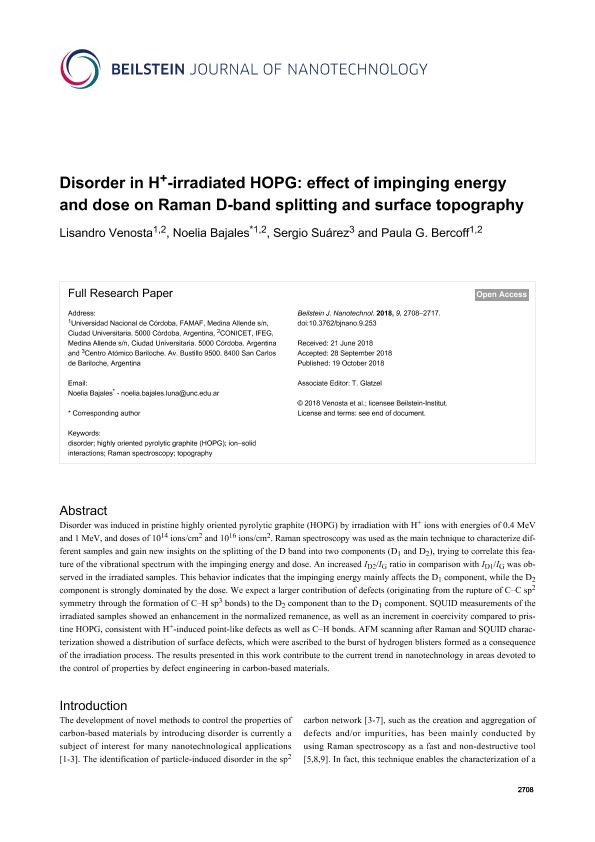Mostrar el registro sencillo del ítem
dc.contributor.author
Venosta, Lisandro Francisco

dc.contributor.author
Bajales Luna, Noelia

dc.contributor.author
Suarez, Sergio Gabriel

dc.contributor.author
Bercoff, Paula Gabriela

dc.date.available
2019-12-06T21:56:22Z
dc.date.issued
2018-10-19
dc.identifier.citation
Venosta, Lisandro Francisco; Bajales Luna, Noelia; Suarez, Sergio Gabriel; Bercoff, Paula Gabriela; Disorder in H+-irradiated HOPG: Effect of impinging energy and dose on Raman D-band splitting and surface topography; Beilstein-Institut; Beilstein Journal of Nanotechnology; 9; 1; 19-10-2018; 2708-2717
dc.identifier.issn
2190-4286
dc.identifier.uri
http://hdl.handle.net/11336/91686
dc.description.abstract
Disorder was induced in pristine highly oriented pyrolytic graphite (HOPG) by irradiation with H+ ions with energies of 0.4 MeV and 1 MeV, and doses of 1014 ions/cm2 and 1016 ions/cm2. Raman spectroscopy was used as the main technique to characterize different samples and gain new insights on the splitting of the D band into two components (D1 and D2), trying to correlate this feature of the vibrational spectrum with the impinging energy and dose. An increased ID2/IG ratio in comparison with ID1/IG was observed in the irradiated samples. This behavior indicates that the impinging energy mainly affects the D1 component, while the D2 component is strongly dominated by the dose. We expect a larger contribution of defects (originating from the rupture of C-C sp2 symmetry through the formation of C-H sp3 bonds) to the D2 component than to the D1 component. SQUID measurements of the irradiated samples showed an enhancement in the normalized remanence, as well as an increment in coercivity compared to pristine HOPG, consistent with H+-induced point-like defects as well as C-H bonds. AFM scanning after Raman and SQUID characterization showed a distribution of surface defects, which were ascribed to the burst of hydrogen blisters formed as a consequence of the irradiation process. The results presented in this work contribute to the current trend in nanotechnology in areas devoted to the control of properties by defect engineering in carbon-based materials.
dc.format
application/pdf
dc.language.iso
eng
dc.publisher
Beilstein-Institut
dc.rights
info:eu-repo/semantics/openAccess
dc.rights.uri
https://creativecommons.org/licenses/by/2.5/ar/
dc.subject
DISORDER
dc.subject
HIGHLY ORIENTED PYROLYTIC GRAPHITE (HOPG)
dc.subject
ION-SOLID INTERACTIONS
dc.subject
RAMAN SPECTROSCOPY
dc.subject
TOPOGRAPHY
dc.subject.classification
Nano-materiales

dc.subject.classification
Nanotecnología

dc.subject.classification
INGENIERÍAS Y TECNOLOGÍAS

dc.title
Disorder in H+-irradiated HOPG: Effect of impinging energy and dose on Raman D-band splitting and surface topography
dc.type
info:eu-repo/semantics/article
dc.type
info:ar-repo/semantics/artículo
dc.type
info:eu-repo/semantics/publishedVersion
dc.date.updated
2019-10-22T16:36:44Z
dc.journal.volume
9
dc.journal.number
1
dc.journal.pagination
2708-2717
dc.journal.pais
Alemania

dc.journal.ciudad
Berlín
dc.description.fil
Fil: Venosta, Lisandro Francisco. Consejo Nacional de Investigaciones Científicas y Técnicas. Centro Científico Tecnológico Conicet - Córdoba. Instituto de Física Enrique Gaviola. Universidad Nacional de Córdoba. Instituto de Física Enrique Gaviola; Argentina. Universidad Nacional de Córdoba. Facultad de Matemática, Astronomía y Física; Argentina
dc.description.fil
Fil: Bajales Luna, Noelia. Consejo Nacional de Investigaciones Científicas y Técnicas. Centro Científico Tecnológico Conicet - Córdoba. Instituto de Física Enrique Gaviola. Universidad Nacional de Córdoba. Instituto de Física Enrique Gaviola; Argentina. Universidad Nacional de Córdoba. Facultad de Matemática, Astronomía y Física; Argentina
dc.description.fil
Fil: Suarez, Sergio Gabriel. Consejo Nacional de Investigaciones Científicas y Técnicas; Argentina. Comisión Nacional de Energía Atómica. Gerencia del Área de Energía Nuclear. Instituto Balseiro; Argentina
dc.description.fil
Fil: Bercoff, Paula Gabriela. Consejo Nacional de Investigaciones Científicas y Técnicas. Centro Científico Tecnológico Conicet - Córdoba. Instituto de Física Enrique Gaviola. Universidad Nacional de Córdoba. Instituto de Física Enrique Gaviola; Argentina. Universidad Nacional de Córdoba. Facultad de Matemática, Astronomía y Física; Argentina
dc.journal.title
Beilstein Journal of Nanotechnology
dc.relation.alternativeid
info:eu-repo/semantics/altIdentifier/url/https://www.beilstein-journals.org/bjnano/articles/9/253
dc.relation.alternativeid
info:eu-repo/semantics/altIdentifier/doi/http://dx.doi.org/10.3762/bjnano.9.253
Archivos asociados
